Taiwan’s 2010 Report of International Coastal Cleanup (ICC)
Taiwan’s 2010 Report of International Coastal Cleanup (ICC)
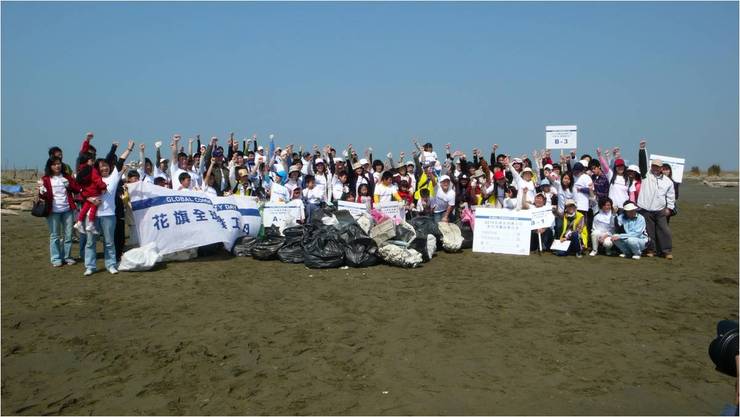
2010
International Coastal Cleanup in Taiwan had engaged 2,561 participants
from 37 organizations. They completed 30 locations around the island.
This
was the year that Taiwan engaged the largest numbers of volunteers for
ICC. The collected data had sent to The Ocean Conservancy for her
annual report, which was issued in March this year.
ICC is one
of the major ocean protection actions around the globe. In 2010, there
were 610,000 volunteers from 114 countries to participate in this
activity. In addition to remove the litter, data was collected for
education purposes. By doing so, the public would increase the
awareness and change daily habits to protect the ocean.
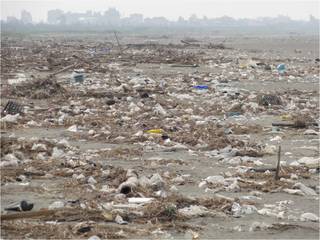
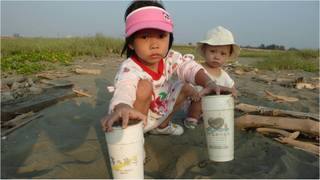
From
the data collected, 30 cleanup activities during September and October
of 2010, the major trash of Taiwan coast is from “Shoreline &
Recreational Activities.” 30,304 items were collected, accounting for
70 % of the total litter. It indicates that 70 % of debris was created
by people’s activities along the shoreline. Or the trash was washed to
the sewage systems then to the ocean by rain or wind because of failing
to well manage the trash in the cities. Beverage bottles, disposable
food containers, plastic bags, wrappers from various kinds of materials
are all belong to this category.
Next is the debris from
“Ocean/waterway Activities,” with 8,022 items and accounting for 18.7
%. Those included fishery equipments, nets, and buoys. Number three
litter of the chart is from “Smoking-related Activities,” including
cigarette filters and tobacco packaging. Final categories are “Dumping
Activities” and “Medical/personal Hygiene,” accounting for 2.5% and
0.3%.
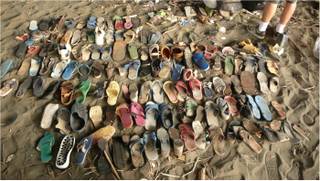
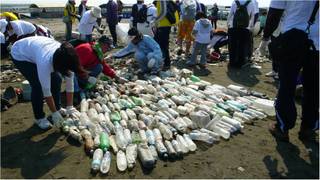
Then
what is the most commonly found trash along Taiwan coast? Plastic
bags, not surprisingly. We collected 8,295 plastic bags along 12.68
kilometers coastline, which means we found one bag within 1.5 meters in
average. Think about how many plastic bags we use in one single day,
according the research:
The global usage of
plastic bag is 1.2 trillions per year; in average one person uses 300
bags per year. More than 1 million of bags are used in one minute
around the globe; the average use time for one single bag is 12 minutes.
Those disposable plastic bags seem convenient and cheap, but we forget the invisible pollution costs after throwing them away.
The
second largest litter is glass bottles, accounting for 7,236. Those
sharp glass pieces could easily hurt the beachgoers. Number three are
the buoys for fishery, made of plastic and Styrofoam, and the total
numbers of them are 6,054. Those top three items account for 50% of the
total litter, showing the management importance of them.
Although
lots of people make endeavors for ocean protection, the ocean pollution
and harm by man-made litter are unimaginable. Marine litter is not
from one single source, and not accumulated within a short period of
time. ICC alone won’t solve the problem. Since the source is from
human, change would only become possible by human’s reflection and
awareness. So The Ocean Conservancy provides several suggestions to
reduce the possibilities to pollute the ocean:
- Properly manage the
litter you create. By doing so, the possibility of trash entering the
ocean by wind or water will be decreased.
- Reduce, reuse, and recycle.
- Avoid buying things overly wrapped, in order not to create more litter.
- Cut the six-pack holders, so it won’t hurt the animals even they are falling into the ocean.
- Join coastal cleanup.
- Share the information of marine litter with your friends.
- Sponsor related plans and activities.
● Taiwan’s 2010 Top Ten Items of International Coastal Cleanup
1. Plastic Bags 8,285 (19.06%)
2. Beverage Bottles (Glass) 7,236 (16.65%)
3. Buoys/Floats 6,054 (13.93%)
4. Caps, Lids 4,283 (9.86%)
5. Beverage Bottles (Plastic) 3,190 (7.34%)
6. Cigarette Filters 2,679 (6.16%)
7. Toys 1,584 (3.64%)
8. Straws, Stirrers 1,566 (3.60%)
9. Clothing, Shoes 1,140 (2.62%)
10. Food Wrappers/Containers 1,123 (2.58%)
Taiwan Ocean Cleanup Alliance (TOCA)
97057,No.87,Fuyang Rd., Hualien City, Hualien County, Taiwan
URL :http:// www.icctaiwan.org.tw
E-mail : kuroshio@seed.net.tw
TEL : +886-3-857-8148
FAX : +886-3-857-8948
TOCA
is a cooperative group of five Taiwan non-profit organizations that
have devoted to solve the marine litter over a long-term basis,
including Kuroshio Ocean Education Foundation, National Museum of Marine
Science & Technology, Tainan Community University, Taiwan
Environmental Information Association, and the Society of Wilderness.
TOCA arouses the public awareness by education, appeal, and research.
Its aim is to unite everyone’s effort to protect the ocean and start a
sea change by making better policies, involving industries, and
adjusting personal daily habits.

回應文章建議規則: